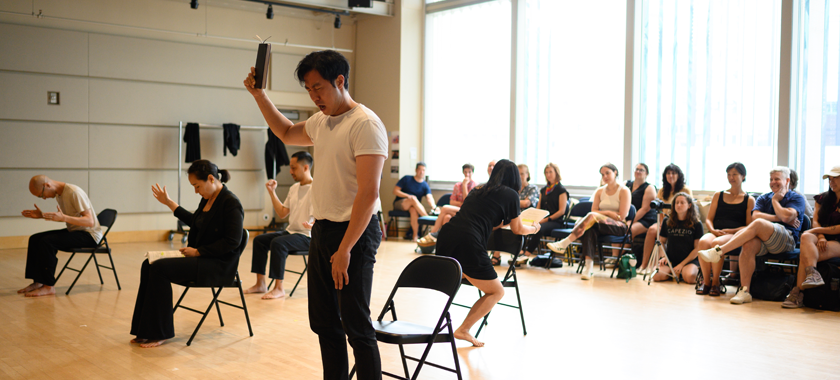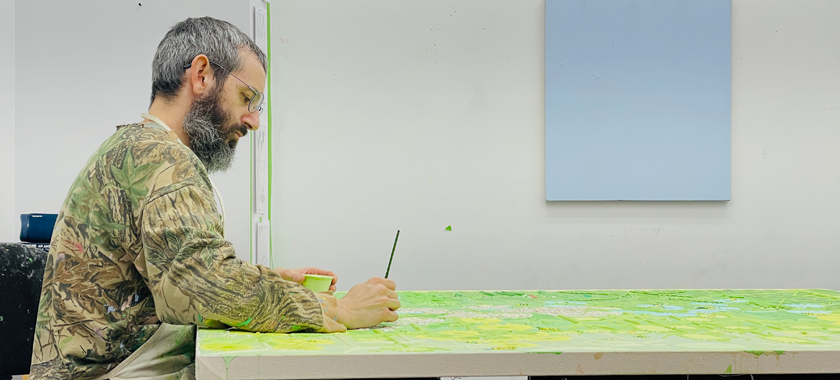
Getting Organized About Grants
How to plan ahead so that you can still have time and energy for your art.
As an artist, you want to reserve as much of your time and energy for your practice and collaborative projects. And yet, it often feels like administrative tasks invade and take over your creative space. Grant writing, budgeting, correspondence, and project management are all important parts of keeping your art projects going, but they should not stress you out, distract you from your practice, or suck up all of your mental capacity and valuable time.
Let’s get organized about grants so that doesn’t happen!

Find grants and opportunities.
Grants are often due very far in advance of when you might actually need them. Planning ahead is key and knowing what’s out there is essential. Here are a few ways to stay informed about grant opportunities:
- Email newsletters: Subscribe to email newsletters from arts organizations who list resources for artists. These include NYFA, Creative Capital, Creatives Rebuild NY, Hyperallergic, Bomb, Fractured Atlas, Union Docs, and others. You can also subscribe to the email newsletters of specific funders as they will keep you up to date on their grant deadlines and new programs.
- Websites: You can find listings of opportunities on websites such as Resartis, Rivet, Residency Unlimited, Artist Communities, Trans Artists, and Women Arts Media Coalition,
- Candid: This is a database of funders available for free at certain public libraries. Find one near you here. Candid also hosts free and low-cost webinars on fundraising and grant writing.
- Researching other artists and projects: Look at other artists’ websites to see what grants they have gotten in the past. Read the fine print of a performance or exhibition program to see how it was funded.
- Be active in your community: Be in conversation with your fellow artists and keep them up to date on what you are doing. Build relationships by showing up for other artists and sharing resources with community members.
Create a calendar and a master grant list.
Now that you have a process of staying in the know about grants, use your calendar or task manager apps to keep track of them.
- Keep a spreadsheet of possible grants for your current and future projects, noting the website, deadline, and any specifics.
- Create a grants calendar. Use whatever calendar app works for you.
- When you add grants to your calendar, make them due two weeks before the deadline. This gives you time to work on the grant and get your materials together.
- Set your calendar entry to repeat annually.
- Confirm deadlines every year, as sometimes they shift, and sometimes funders pause programs.

Create a plan to work on grants and keep your materials organized.
The key to working efficiently on grants is organizing your materials and your time. The first time you write a proposal for a specific project will take you longer than usual. After that, you should be able to reuse written materials and tailor them for different grants without starting over from scratch. Having your materials ready will also make it easy to apply for multiple grants at once. Here are some tips for working on your plan:
- Create a designated time to work on your grant well-ahead of the deadline. This reduces stress and gives you time to reach out to the funder with questions, ask for letters of recommendation, and proofread your work.
- Do not compose your grant directly in the application. It is very easy to accidentally lose your work if you do. Instead, copy the application questions into Word, Google Docs, Notes, or your preferred app. These platforms will have better spelling and grammar checks, and you will be able to save and access your drafts.
- Save different versions of your bio/resume/CV. Many grants will ask for similar information (example: a 100-word bio, a 1-page resume). Once you have these drafts, you will only have to update them with your new projects.
- Same thing with work samples. You will reuse these 2-minute videos, 10 poems, or 5 images. Have your strongest work samples well-edited and easy to access.
- Use the budget of a previous project to create a template for your new project. You can also find budget templates online, and some funders provide their own.
- Always download a copy of the grant you have submitted. There should be an option for this after you submit your application in an online grant portal.

Create a tracking spreadsheet.
You’ve submitted your grant! Congrats! Now, let’s keep track of it and build a spreadsheet that will help you analyze your submissions for your project.
- Create a basic spreadsheet with columns for the name of the grant, which project you applied for, which work samples you used, who your references were, and when you expect to be notified about the grant.
- Add a column for any personal notes to yourself. For example, I was invited to apply; total long shot; received this 5 years ago for a different project.
- Note or color code the grants when you hear if you received the grant, your proposal was declined, or you were waitlisted.
- Add a column and record any feedback you receive from the funder. For example, made it to the final round; funder had less money this year and therefore fewer grants awarded; great response from the panel.
Create your art.
This is the most important part. Keep creating your art. You will get rejected. A lot. Grants are highly competitive, and sometimes it feels useless to apply. But applying for grants isn’t just about getting the grant. It’s about advocating for your work and your community, being a part of the conversation about the arts ecosystem, and getting your ideas heard and discussed.
–Andrea Kleine, Program Officer, Fiscal Sponsorship
Sign up for NYFA News and receive artist resources and upcoming events straight to your inbox.
- NYSCA and NYFA Announce Innovative Grant Program to Establish Reserve Funds for NYS Arts and Culture Nonprofits
- The Key to A Successful Collaboration: A Conversation with Artist Sizhu Li and Curator Jacqueline Saragoza McGilvray
- NYFA Inducts Jaye Moon, JT Rogers, Cristina Enriquez-Bocobo, and Commissioner Laurie Cumbo into its Hall of Fame at Annual Spring Benefit